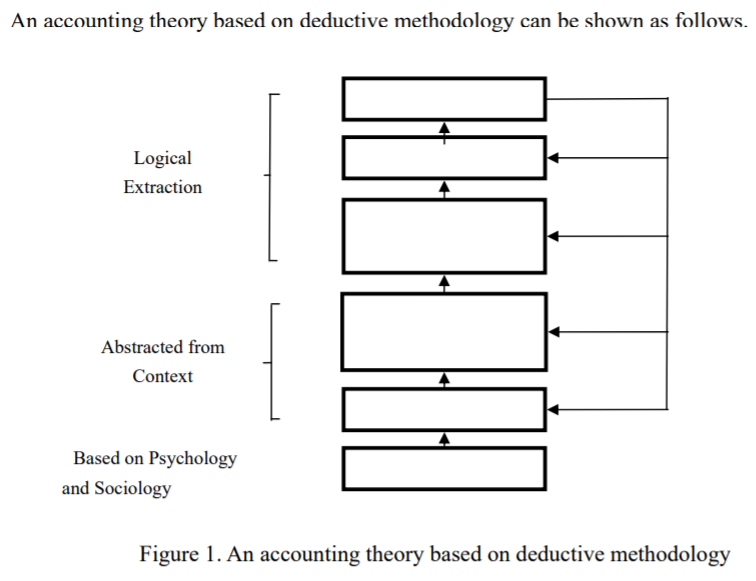Induction is a reasoning method by which a law or a general principle would be inferred via observing specific cases. The inductive approach emphasizes on observation and deriving conclusions through observation. It generally moves from specific to general, since the researcher generalizes his limited observations of specific circumstances to general conditions. In accounting, the inductive approach begins by observing the financial information of the companies and progresses towards constructing accounting generalizations and principles out of those observations and reoccurring relations.
In deductive approach, in order to achieve a consensus, the structure of logical reasoning needs to be quite formal. However, in inductive approach, the accounting practice can turn into accounting principles. Accounting standard setters, extracted the conceptual framework via the best practices which in turn have been identified based on the assumed objectives of financial reporting. At the same time, attention was paid to the conceptual integrity, because the framework has been developed descriptively, although the objective was to make an imperative framework for providing guidelines to set and interpret accounting standards.
Deductive Approach
This approach involves developing a theory from elementary proposals, premises and assumptions which results in accounting principles that are reasonable conclusions about the subject. The theory is verified by determining whether its results are acceptable in practice. Edwards and Bell are deductive theorists and historical cost accounting was also derived from a deductive approach.

The deductive approach constitutes developing of an assumption based on the existing theories and forming a research plan to test the assumption (Wilson, 2010). The deductive approach can be explained using the assumption driven from theory. In other words, the deductive approach includes deducing the results from the premises. When a deductive method is applied for a research project, the author formulates a set of hypotheses that need to be tested and next, using a relevant methodology, tests the hypothesis. Deductive reasoning has specific characteristics that needs be understood. If the premises of deductive reasoning are accepted, then, the conclusion must necessarily be accepted. In a deductive reasoning, the contents of the result are implicitly stated in the premises, making such argument a non-ampliative one. If new premises are added to the argument, then the conclusion must still follow. A deductive argument is either valid or invalid and there is no degree of validity. There is no choice or decision in applying such argument and no judgment is necessary for getting the result and conclusion.
Inductive Approach
For this approach we start with observed phenomena and move towards generalized conclusions. The approach requires experimental testing, i.e. the theory must be supported by sufficient illustrations/observations that support the derived conclusions. Fairly often the logical and inductive approaches are mixed as researchers use their knowledge of accounting practices. As Riahi-Belkaoui states: General propositions are formulated through an inductive process, but the principles and techniques are derived by a deductive approach. He also observes that when an inductive theorist, collaborates with a deductive theorist, a hybrid results showing compromise between the two approaches.
Inductive approach begins with specific observations and the conclusions are generalized. In inductive approach, after selecting a number of observations correctly, one can generalize the conclusion to all or groups of similar conditions and situations. These generalizations need to be tested, some of which might be verified and some rejected. Accordingly, all of the principles which are derived based on inductive reasoning are theoretically falsifiable. In the induction process, the researcher as an observer, should honestly, without any prejudgments and biases, and with an impartial mind, register what they observe. Then these observations form a basis on which theories and laws are constructed which make up the scientific knowledge. Inductive researchers also believe that one can logically generalize the observations into general and inclusive rules and the scientific assumptions get verified and ratified.
According to the inductive approach, at the end of research and as a result of observations, theories are constructed. The inductive approach includes looking for a pattern based on the observations and developing a theory for those patterns through hypotheses. In inductive research, no theory is applied at the beginning of the research and the researcher enjoys complete freedom in terms of determining the course of research. Particularly, there is no assumption at the early stages of research and the researcher is not sure about the kind and the nature of findings as research is not finished yet. In inductive reasoning the researcher uses the observations in order to construct an abstract or to describe the circumstances being.
The main advantage of the inductive method is that there is no necessity for any pre-fabricated framework or model. Obviously, while principles are generalized they should be verified through a logical method (deductive approach). The inductive approach towards science has been criticized concerning some aspects. The main issue of the inductive method can be the researchers’ being influenced by their limited knowledge of the relations and the data of the research. Some claim that induction as a principle is falsifiable because it is based on human observations.